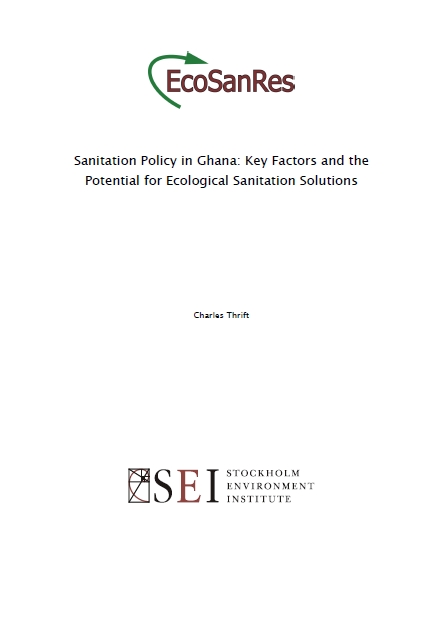Sanitation policy in Ghana: Key factors and the potential for ecological sanitation solutions
Thrift, C. (2007)

Published in: 2007
Publisher:
Stockholm Environment Institute (SEI), Stockholm, Sweden
Author:
Thrift, C.
Uploaded by:
SuSanA secretariat
Partner profile:
common upload
5565 Views
79 Downloads
Location of library entry
Content - Summary
Ghana presents an interesting case for the ecosan programme: in several districts, there are already competitive markets for faecal sludge, the most common sanitation technology in urban areas is a double-vault composting VIP latrine, and there is ample private-sector involvement in sanitation provision.
This paper summarizes the current sanitation and sanitation policy needs for Kumasi, Ghana, and outlines some potential opportunities for ecosan in Ghana. The production of this report could not have happened without the support of the International Institute for Sustainable Development (IISD) and the sponsorship of the Canadian Department of Foreign Affairs and International Trade. Contributions to this research were: Dr. Ronald Adamtey, Louis Addy, Patrick Apoya, Dr. John Bakang, Dr. Olufunke Cofie, Dr. Pay Drechsel, Ben Keraita, Dr. Rudith King, Prosper Kotoka, Dr. Elisabeth Kvarnström, Eugene Larbi, Dr. Liqa Raschid-Sally, Dr. Arno Rosemarin (supervisor), Cecilia Ruben, and Charles Woahene.
Bibliographic information
Thrift, C. (2007). Sanitation policy in Ghana: Key factors and the potential for ecological sanitation solutions. Stockholm Environment Institute (SEI), Stockholm, Sweden
Filter tags
English Sub-Saharan Africa Urban (entire city)














